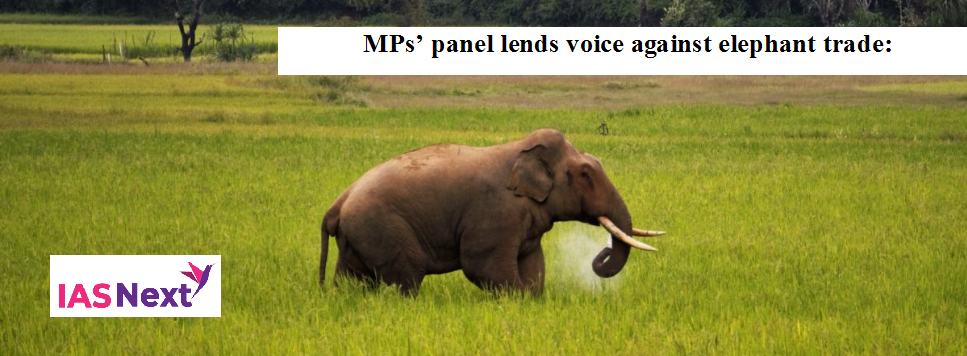CURRENT AFFAIRS
Get the most updated and recent current affair content on Padhaikaro.com
MPs’ panel lends voice against elephant trade
- IAS NEXT, Lucknow
- 18, Apr 2022

Reference News:-
The Wild Life (Protection) Amendment Bill, 2021 after being introduced in Lok Sabha was later referred to the Standing Committee on Science and Technology, Environment, Forests and Climate Change.
- The panel has recently recommended the Central Government not to encourage sale and purchase of captive elephants.
Need for:
Section 43 of the Wildlife (Protection) Act, 1972 states that no person having in his possession captive animal, animal article, trophy or uncured trophy in respect of which he has a certificate of ownership shall transfer by way of sale or offer for sale or by any other mode of consideration of commercial nature, such animal or article or trophy or uncured trophy.
- The amended Bill introduces an exemption clause for elephants.
Other issues wrt Bill highlighted by the standing committee:
- The Standing Committee pointed out that a number of species is missing in all the three Schedules.
- The committee also finds species that should be in Schedule I but have been placed in Schedule II.
- There are species missing altogether both in Schedules I and II as well as in Schedule III.
- The Bill also fails to address “human-animal conflict”, the committee noted.
Highlights of the Wild Life (Protection) Amendment Bill, 2021:
The proposed amendment is likely the most expansive so far in scope: it covers more areas of legislation, from trade in wild species to permitting filmmaking in protected areas and controlling the spread of invasive species.
Positives:
- The Bill increases penalties for wildlife crimes. For example, offences that attracted a fine of Rs 25,000 now attract Rs 1 lakh.
- There’s a new and separate chapter on regulating species involved in international trade according to the CITES treaty.
- The Bill prohibits possessing, trading and breeding species without prior permissions from CITES authorities.
- The Bill also recognises threats that invasive alien species pose.
What’s missing in the bill? What are the concerns?
The Bill doesn’t include regional invasive species – some of which may be native to the country but invasive in some parts.
The amendment Bill has no separate Schedule for species the Act classifies as ‘vermin’, so the Centre can directly notify such species and open them up to be hunted – including some of the species currently in Schedule II.
The Bill also proposes changes to the Schedules. Foremost, it reduces the number of Schedules from six to four, to “rationalise” the lists. But the two main substitute Schedules that will specify the protected species are incomplete.
The Bill will render the existing ‘State Boards for Wildlife’ defunct by replacing it them with set up a ‘Standing Committee’ of the State Board of Wildlife – headed by the respective state forest minister and 10 members nominated by the minister.
- The State Boards of Wildlife currently manage the conservation and protection of wildlife at the state level. The state chief minister sits atop the board and is supported by 20+ members, including of the state legislature, NGOs, conservationists and representatives of the state forest departments and tribal welfare.
Under the proposed amendments, the commercial sale and purchase of elephants will no longer be prohibited under the Act. This clause is prone to abuse and can severely impact elephant populations by legitimising live trade of elephants.
In 1972, Parliament enacted the Wild Life Act (Protection) Act:
The Wild Life Act provides for:
- state wildlife advisory boards,
- regulations for hunting wild animals and birds
- establishment of sanctuaries and national parks
- regulations for trade in wild animals, animal products and trophies
- judicially imposed penalties for violating the Act
- Harming endangered species listed in Schedule I of the Act is prohibited throughout India.
- Hunting species, like those requiring special protection (Schedule II), big game (Schedule III), and small game (Schedule IV), is regulated through licensing.
- A few species classified as vermin (Schedule V), may be hunted without restrictions.
- Wildlife wardens and their staff administer the act.
- An amendment to the Act in 1982, introduced a provision permitting the capture and transportation of wild animals for the scientific management of the animal population.
Constitution of Various Bodies:
The WPA act provides for the constitution of bodies to be established under this act such as the National and State Board for Wildlife, Central Zoo Authority and National Tiger Conservation Authority.
Constitutional Provisions for Wildlife:
- The 42nd Amendment Act, 1976, Forests and Protection of Wild Animals and Birds was transferred from State to Concurrent List.
- Article 51 A (g) of the Constitution states that it shall be the fundamental duty of every citizen to protect and improve the natural environment including forests and Wildlife.
- Article 48 A in the Directive Principles of State policy, mandates that the State shall endeavor to protect and improve the environment and to safeguard the forests and wildlife of the country.